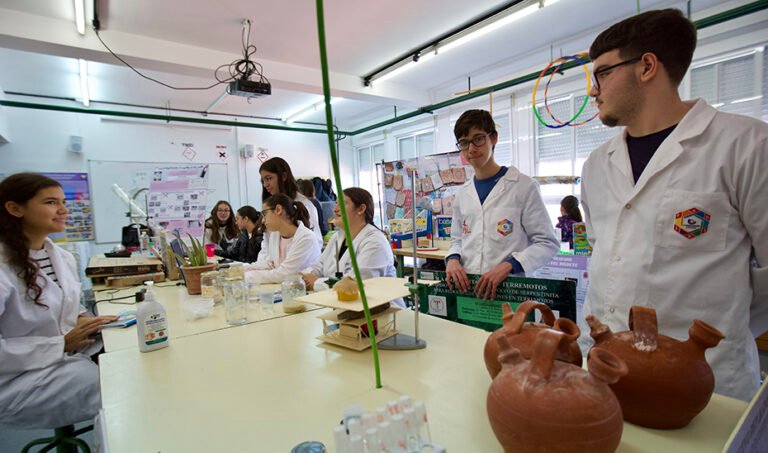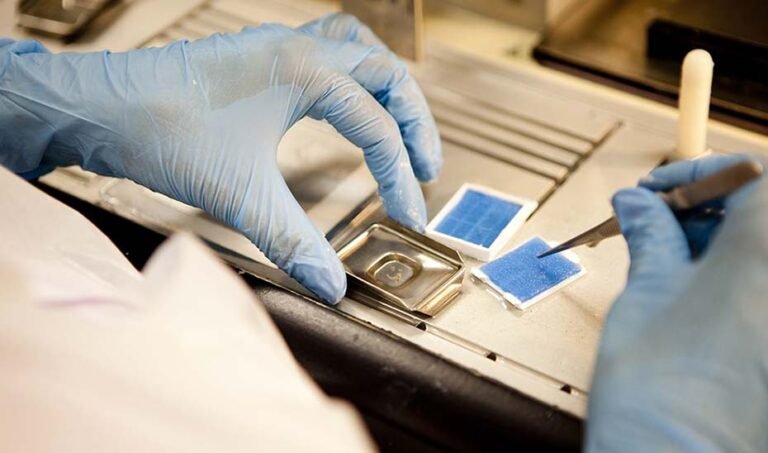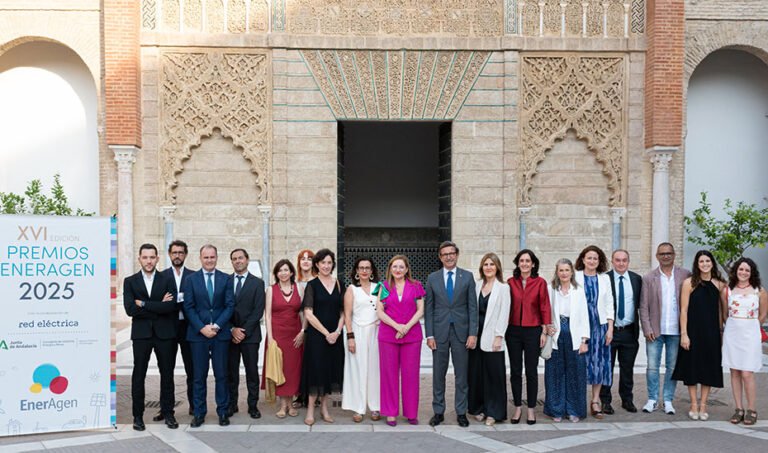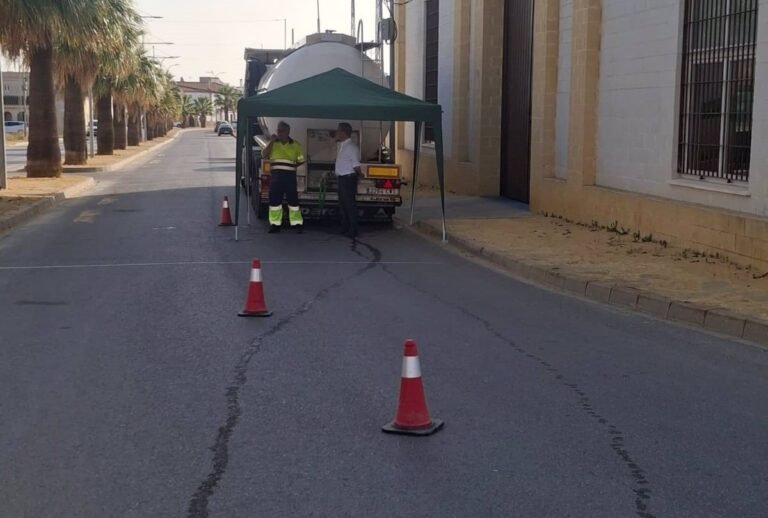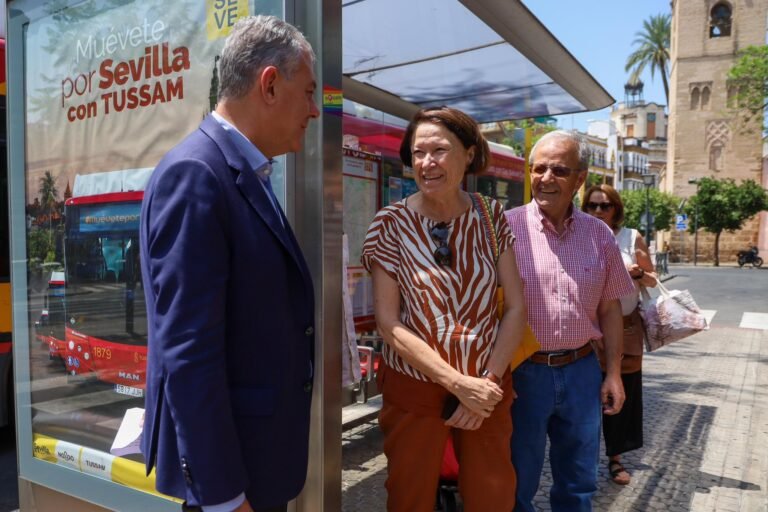
The Minister of Sustainability and Environment, Catalina García, has participated in the laying of the foundation stone for the new line of selectively collected bio-waste treatment at Ecocentral Granada, in the municipality of Alhendín, promoted by the Granada Provincial Council with the support of the Andalusian Government. Also, she announced a new direct grant to the provincial organization for the automated composting plant project. For both projects, the Andalusian Administration has granted subsidies worth 19.4 million.
The event was also attended by the President of the Provincial Council, Francisco Rodríguez, the Government Delegate of the Junta de Andalucía in Granada, Antonio Granados, the Mayor of Alhendín, Jorge Sánchez, the Director General of Environmental Sustainability and Circular Economy of the Junta de Andalucía, Carmen Jiménez, the General Director of FCC Medioambiente S.A., Francisco Javier Irigoyen, the Territorial Delegate of Sustainability and Environment in Granada, Manuel Francisco García, and the Water Deputy, Antonio Mancilla, among other authorities.
The Minister of Sustainability emphasized that this new public investment will allow the Granada Provincial Council to build a state-of-the-art facility that will significantly improve the treatment of organic waste, thus meeting the objectives set by the European Union. «We have strongly committed to supporting local entities in transforming waste management and moving towards a more circular economy, low in emissions, and committed to sustainability,» García said, highlighting that «bio-waste represents one of the main challenges today and also one of the greatest opportunities in environmental matters.»
The automated composting plant project, which will also be located at Ecocentral Granada, has a total budget of over 23.9 million euros, of which 15.8 million will be co-financed by the Andalusian Government through European NextGenerationEU funds, under the Recovery, Transformation, and Resilience Plan.
García explained that this new complex, expected to be operational by the summer of 2026, will treat approximately 80,000 tons per year of the organic fraction collected separately in all municipalities of the province. «We are talking about a decisive step in municipal waste management, which will allow us to reduce waste disposal, improve recycling rates, and obtain high-quality compost,» she noted.
Additionally, the Andalusian Government has granted a subsidy of 1,021,880.30 euros to the Granada Provincial Council for the development of a compost refining plant at the Loma de Manzanares Environmental Complex (Ecocentral Granada) in Alhendín. This action, with a total budget of 1,766,645.45 euros, is part of the Recovery, Transformation, and Resilience Plan funded by the European Union. The project will enhance the treatment of selectively collected organic waste, optimizing the quality of the obtained compost and promoting more efficient management of natural resources.
In her speech, Catalina García emphasized the Andalusian Government’s commitment to promoting environmental infrastructures «that address regulatory challenges, generate green employment, and reinforce the role of the environment as a driver of provincial development.» The Minister added that this plant is a key tool to comply with Law 7/2022 on waste and polluted soils for a circular economy, which requires the separate collection and treatment of organic matter.
Tangible and measurable environmental improvement
In addition to the composting project, the Andalusian Government also supports the new bio-waste treatment line symbolically inaugurated with the laying of the foundation stone, with a subsidy of over 2.5 million euros, also co-financed with European NextGenerationEU funds, representing about 49% of the total project budget of 5.3 million. This action will optimize current processes of receiving and classifying organic waste at the source.
As detailed by the Minister, «the new treatment line will include enhancements such as expanding the sorting warehouse, a new pit with the capacity to store up to 80,000 tons per year of bio-waste, and an automated system to separate improper materials and recover valuable fractions that may come with separately collected bio-waste.» Catalina García emphasized that «all these efforts respond to an efficient, modern management model aligned with the principles of circular economy.»
Both projects, the pre-treatment line and the automated composting plant, form an integral strategy to maximize the valorization of the organic fraction of household waste and prevent its disposal in landfills. The Minister stated that «these initiatives will result in a tangible and measurable environmental improvement, placing the province of Granada in a position of leadership in sustainable waste management.»
She also appreciated the institutional collaboration with the Provincial Council and the municipalities of the province, stating that «this type of partnership demonstrates that when administrations cooperate, major projects become feasible.» In this regard, she congratulated the Provincial Council for promoting these investments and for its role as a supramunicipal entity to ensure that all towns in Granada can meet European standards. «Granada is now an example of how well-managed European funds translate into real progress that improves the quality of life for citizens and protects our environment,» she added.
In addition to these two major projects, she highlighted that the Ministry has also allocated a total of 1.94 million euros for the improvement of the Mechanical-Biological Treatment plants in Alhendín and Vélez de Benaudalla, also processed by the Granada Provincial Council.
Measures for waste management
García also pointed out the Andalusian Government’s commitment to improving waste management and supporting municipalities in this task, stating, «We have provided subsidies and investments amounting to 166 million euros for the implementation of effective collection and treatment of municipal waste.» She highlighted the Andalusian Clean Points Plan, «which will bring to life 12 new facilities of this kind, with a budget exceeding seven million euros,» the Transfer Stations Plan for Bio-waste, with a budget of four million, and the various aid lines for separate collection of bio-waste worth 45 million euros, to which additional grants totaling eight million will be added.
Additionally, she mentioned the incentives for the acquisition of bio-waste collection vehicles, amounting to ten million euros, those allocated to treatment facilities and improvement of existing infrastructures, with two lines of 36 million euros (for the construction and adaptation of bio-waste treatment facilities), and another two lines, totaling 21 million, for the improvement of Mechanical-Biological Treatment (MBT) facilities or the subsidies, totaling 35 million, for the construction and adaptation of bio-waste treatment facilities, which she considered crucial.
In this context, she highlighted the significant increase in the Andalusian budget for this year: «In 2025, the budget allocated by the Government for circular economy and waste management has increased by 68% compared to the previous year, reaching 137.9 million euros.» Finally, she recalled that the regional government is promoting Local Circular Economy Plans and has activated new grants totaling three million euros for their drafting.

